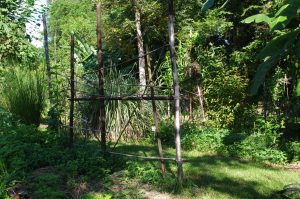A Brief History of the Ethnoecology Garden
by John Anderson, Department of Environmental and Global Health, College of Public Health and Health Professions
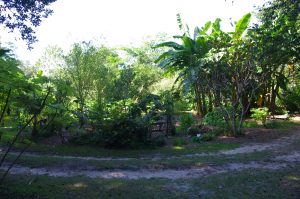
Ethnoecology is the study of the dynamic relationships between people and their natural environment. The Ethnoecology Garden is an interactive laboratory and forum for students to learn by exploring these relationships and interactions with a diverse community of UF students, faculty and staff, local experts and visitors. The garden began about 20 years ago after a visit by the eminent ethnobotanist, Dr. Richard Schultes (1). During his visit, Dr. Schultes found UF to be a favorable institution for ethnobotanical studies because of the composition of botany, anthropology, geography and agriculture faculty and students at UF with research interests all over the world.
One of those influential faculty members, the late Dr. Hugh Popenoe (2), specialized in tropical soil management with a particular interest in low input aspects of traditional agricultural systems. He began his academic career by completing his dissertation work on the effects of shifting agriculture on basic soil properties in Guatemala, near Lago Izabel. Dr. Popenoe studied milpa systems to better understand traditional practices in a time when many scholars considered them primitive and arcane. However, Dr. Popenoe recognized the value of lower input systems, which require fewer energy inputs per calorie of harvested food.
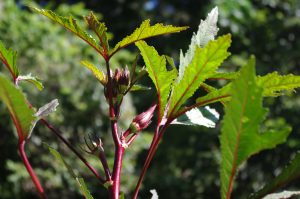
During his dissertation work, Dr. Popenoe began an influential collaboration with Dr. Harold Conklin (3), a Yale anthropologist who was studying the ecological knowledge and agricultural processes of the Hanunóo people who live in the southern region of Mindoro Island in the Philippines. Dr. Conklin was the first to publish the word “Ethnoecological” in a scientific publication (4). Dr. Conklin’s work documented the extensive and complex Hanunóo ethnoecological knowledge system, which consisted of a plant taxonomy with more named plants than the current Western taxonomic system, and a cyclical planting and harvesting system that resembled management of natural ecological succession. Dr. Conklin invited Dr. Popenoe to his field site to consult him about soil management. This experience forged a lifelong commitment to ethnoecological studies that Dr. Popenoe brought back with him to UF.
After Dr. Schultes visit to UF, a group of inspired students under Dr. Popenoe’s guidance formed the UF Ethnobotanical Society. Dr. Popenoe arranged for them to manage a small plot of land to begin propagating plant species and practice land management techniques that reflected traditional and modern low-input agriculture and agro-biodiversity. Some of the founding members have moved on to careers that began and were influenced by their time at UF and in the Garden, including Dr. Will McClatchey (5) and Michael Bond (6). Eventually the UF Ethnobotanical Society became the UF Ethnoecological Society, to reflect the larger systems approach to interactions between people and their environment.
After a few years and the graduation of many of these members, the garden fell fallow until it was resurrected by one of Dr. Popenoe’s graduate students, Jay Bost (7), in the Fall of 2006. Jay quickly recruited a new membership from Dr. Popenoe’s Ethnoecology course and reconnected with faculty across the UF campus, including anthropologist, Dr. Rick Stepp (8) and geographer, Dr. Nigel Smith (9), both of whom have contributed ideas and materials to the Garden. The new membership worked to improve the garden, expanding the collection to more than 100 species and includes annuals and perennials all grown using low-input agricultural techniques. The Ethnoecology Society membership grew to contain undergraduate and graduate students from a wide variety of disciplines at UF including the former Botany Department, the School of Natural Resources and the Environment, the Department of Anthropology, and Environmental Horticulture.
The Current Ethnoecology Garden
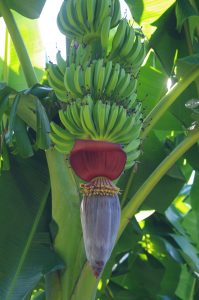
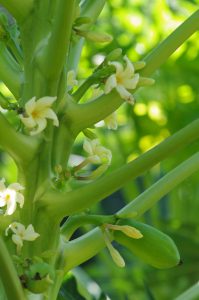
Currently at the garden, we continue Dr. Popenoe’s teachings experimenting with crops and alternative resource management techniques. Among some of our activities, we fertilize the garden with local bat guano as people do in Vietnam, plant rice paddies like the Balinese, build raised beds, use local mulch as a soil amendment, compost local and garden refuse, and inoculate shiitake mushroom logs. We have planted pigeon peas, chaya, winged beans, vetiver grass and large gourds, exposing ourselves and other students to lesser-known plants with great promise for sustainable agriculture. Currently, Dr. Richard Stepp now teaches classes in Ethnoecology and related research methodology. Our group has grown and now includes many students from the Masters of Development Practice program as well as many of the aforementioned departments. We collaborate closely with our neighbors at the UF Organic and Sustainable Agriculture Club (10) and UF Student Agricultural Gardens (11).
The Garden is always looking for new members to bring their fresh ideas and interest in all things ethnoecological. Our current President is Dan Stirling of the Master’s in Development Practice Program (12). You can follow us on Facebook (13) or send an email to ethnoecology@gmail.com. Recently, the Ethnoecology Garden has received attention in The Alligator (14) as well as The Fine Print (15).
The Garden’s Mentor
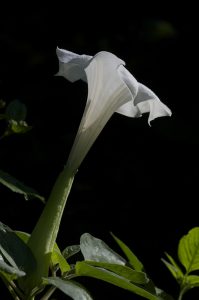
During his career, Dr. Hugh Popenoe taught two popular courses, Ethnoecology and Tropical Soils Management and was also an administrator for several programs at the University, including the Director of Internation Programs for IFAS. His influence on the fields of ethnoecology and ethnobotany are far-reaching, advising students such as Dr. Will McClatchey (5) and the Biology Department’s Dr. Jack Ewel (16). Just before his passing in 2011, Dr. Popenoe was bestowed the Charles B. Heiser, Jr. Mentor Award by the Society of Economic Botany. His former student, Jay Bost, wrote a short biography published in the Society of Economic Botany Newsletter that outlines Dr. Popenoe’s invaluable contributions (17).
Links
1) http://www.huh.harvard.edu/libraries/schultes.htm
2) http://soils.ifas.ufl.edu/personnel/popenoe.html
3) http://classes.yale.edu/02-03/anth500a/projects/project_sites/00_neidel/hanunoo&ifugao.htm
4) http://onlinelibrary.wiley.com/doi/10.1111/j.2164-0947.1954.tb00402.x/abstract
5) http://www.brit.org/StaffDirectory/McClatchey
6) http://solutionsforyourlife.ufl.edu/map/seminole_tribe.html
7) https://www.researchgate.net/profile/Jay_Bost/
8) http://www.clas.ufl.edu/users/stepp/index.html
9) http://geog.ufl.edu/people/faculty/smith/
10) http://hos.ufl.edu/clubs/organic-gators-club
11) http://sustainable.ufl.edu/faqs/where-is-the-student-garden-and-how-do-i-get-a-plot/
12) http://www.africa.ufl.edu/mdp/people/currentstudents.html
13) https://www.facebook.com/pages/Ethnoecology-Society/139172371051
14) http://www.alligator.org/news/campus/article_4c94030f-0de3-578e-b5d9-e31338b275c5.html
15) http://www.thefineprintuf.org/2013/10/30/edibly-educated/
16) http://www.biology.ufl.edu/people/faculty/jackewel.aspx
17) http://www.econbot.org/webmaster/pubs_p&p/issues/2011_fall.pdf
